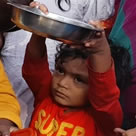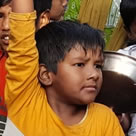Bangladesh Rural Food Relief by Lotus Ministry : Aid for Poor Residents
- David Burgess
- Mar 27, 2025
- 7 min read
Bangladesh, a nation rich in culture and resilience, often finds itself grappling with the challenges of food insecurity, particularly in its rural areas. Lotus Ministry has stepped up to address this pressing issue through innovative and compassionate food relief initiatives.
Key Takeaways
Lotus Ministry provides food relief containing nutritious staples like rice and lentils to rural Bangladeshi families.
Natural disasters significantly impact food supply in Bangladesh, making aid crucial.
Local partnerships enhance the effectiveness of food distribution.
Community engagement and volunteer efforts play a vital role in the success of the program.
Long-term goals include building self-sufficient and resilient communities.

Lotus Ministry Trust Food Relief Distribution In Bangladesh
Introduction to Bangladesh Rural Food Relief by Lotus Ministry
In rural Bangladesh, food insecurity is more than just a lack of meals; it’s a daily struggle that affects health, education, and overall well-being. Lotus Ministry, with its dedicated team and robust programs, is making a tangible difference in the lives of many.
Overview of the Initiative
Lotus Ministry's food relief initiative is designed to provide immediate nutritional support while fostering long-term community resilience. By focusing on both short-term and sustainable solutions, they aim to break the cycle of poverty that plagues many rural families.
Significance for Rural Communities
For families in rural Bangladesh, access to food means more than just survival. It’s about hope, opportunity, and the possibility of a brighter future. The relief efforts by Lotus Ministry empower individuals to focus on education and economic opportunities, creating a ripple effect of positive change.
Understanding the Challenges in Rural Bangladesh
Rural Bangladesh faces a unique set of challenges that exacerbate food insecurity. From natural disasters to economic instability, these issues require targeted interventions.
Most importantly, the geographical and climatic conditions in Bangladesh often lead to natural disasters like floods, which can devastate farmland and disrupt food supply chains.
Food Insecurity and Poverty
Poverty is a significant barrier to food security in rural Bangladesh. Many families live below the poverty line, making it difficult to afford basic necessities, including food. To address this issue, initiatives like the Rural Bangladesh Food Assistance Program are being announced to provide aid and support to these communities.
Besides that, limited access to markets and resources compounds the problem, leaving families with few options for purchasing affordable, nutritious food.
Impact of Natural Disasters on Food Supply
Natural disasters like floods and cyclones are common in Bangladesh and have a profound impact on food supply. These events can wipe out crops, destroy infrastructure, and displace communities.
The frequency and severity of these disasters mean that rural communities are often in a constant state of recovery, which hampers long-term development and food security efforts.
To illustrate, a severe flood can destroy a season's worth of crops, leaving families without income or food for months. This vulnerability underscores the importance of effective food aid programs.
Lotus Ministry's Approach to Food Relief
Lotus Ministry has developed a comprehensive approach to food relief that addresses both immediate needs and long-term sustainability. By collaborating with local organizations and focusing on community involvement, they ensure that aid is both effective and empowering.
One of the core components of their strategy is the distribution of food packages containing culturally appropriate and nutritious staples like rice, lentils, and local vegetables. This not only addresses hunger but also respects the dietary preferences of the communities served.
“Lotus Ministry’s food aid empowers families to focus on education and employment, breaking the cycle of poverty.”
Partnerships with Local Organizations

A Lotus Ministry Volunteer Partner Helps With Food Relief In Bangladesh
Partnerships with local organizations are crucial to the success of Lotus Ministry’s food relief efforts. These collaborations enable more efficient distribution and ensure that aid reaches those who need it most.
Local partners provide invaluable insights into community needs and logistics, helping to tailor food aid initiatives to be as effective as possible.
Distribution Strategy and Reach
The distribution strategy of Lotus Ministry is designed to maximize reach and efficiency. By partnering with local organizations and community leaders, they ensure that food aid is delivered directly to those who need it most. This localized approach allows for a more targeted and effective distribution process.
To enhance their reach, Lotus Ministry also employs mobile distribution units that can navigate difficult terrains and reach remote villages. This flexibility ensures that even the most isolated communities receive the aid they need.
Community Engagement and Support
Community engagement is at the heart of Lotus Ministry's food relief efforts. By involving local communities in the planning and implementation of food aid programs, they foster a sense of ownership and empowerment among recipients.
Moreover, community members are encouraged to participate in volunteer activities, helping with the distribution and organization of food aid. This involvement not only strengthens community bonds but also ensures that aid is distributed fairly and efficiently.
“Community engagement is crucial for the success of food relief initiatives. It empowers individuals and fosters a sense of ownership and responsibility.”
Volunteering Opportunities
Volunteering with Lotus Ministry is a rewarding experience that allows individuals to make a tangible impact on the lives of rural families. Volunteers can participate in a variety of activities, from packing and distributing food packages to organizing community events and workshops. For more information, you can read about the Bangladesh Food Relief Program and how it supports rural communities.
By volunteering, individuals not only contribute to a worthy cause but also gain valuable insights into the challenges faced by rural communities. This experience can be transformative, fostering a deeper understanding and empathy for those in need.
Long-Term Goals and Sustainability
“Lotus Ministry aims to build self-sufficient communities that can withstand future challenges and thrive independently.”
The long-term goals of Lotus Ministry extend beyond immediate food relief. They are committed to building resilient communities that can sustain themselves in the face of future challenges. This involves investing in community development projects, such as agricultural training and resource management workshops.
By equipping community members with the skills and knowledge they need to manage their own food security, Lotus Ministry is paving the way for sustainable change. This focus on capacity building ensures that communities are better prepared to handle future crises independently.
Building Resilient Communities
Building resilient communities is a multifaceted process that requires collaboration, innovation, and perseverance. Lotus Ministry is committed to this goal and is actively working with community leaders and organizations to implement sustainable solutions.
Through these initiatives, Lotus Ministry is fostering a culture of resilience and empowerment, where communities are equipped to face future challenges with confidence and determination.
“By investing in community development, we are creating a foundation for sustainable change and long-term success.”
Pathways to Self-Sufficiency
Self-sufficiency is the ultimate goal of Lotus Ministry's food relief efforts. By empowering individuals and communities with the tools and resources they need to thrive, they are helping to break the cycle of poverty and dependency.
How to Get Involved and Support

Bangladeshi Villagers Supported With Food Relief
Supporting Lotus Ministry's food relief efforts is a meaningful way to make a difference in the lives of rural families in Bangladesh. There are several ways to get involved, from making a donation to volunteering your time and skills.
Donations can be made online through the Lotus Ministry website, and every contribution goes directly towards funding food aid programs and community development initiatives.
Additionally, raising awareness about the challenges faced by rural communities and the work of Lotus Ministry can help garner support and resources for their cause.
Donation Options
Supporting Lotus Ministry's food relief efforts is a powerful way to contribute to the well-being of rural families in Bangladesh. Donations are critical as they directly fund the procurement and distribution of food aid. Every dollar counts and goes a long way in providing much-needed assistance to those in need.
Online donations can be made through the Lotus Ministry website.
Consider setting up a monthly donation to provide ongoing support.
Corporate sponsorships and partnerships are also welcome to expand the reach and impact of the program.
Your generosity not only helps to alleviate immediate hunger but also supports long-term community development initiatives. By investing in these efforts, you are contributing to a brighter future for countless families.
Remember, even a small donation can make a big difference. With your help, we can continue to deliver life-saving food aid and empower communities to thrive independently.
Raising Awareness
Raising awareness about the challenges faced by rural communities in Bangladesh and the work of Lotus Ministry is essential for garnering support and resources. By spreading the word, you can help amplify the impact of these vital food relief efforts.
Consider organizing events or campaigns in your community to highlight the importance of food security and the role of Lotus Ministry. Sharing stories of impact and success on social media platforms can also inspire others to get involved and support the cause.
Frequently Asked Questions (FAQ)
To provide further clarity and understanding, here are some common questions about Lotus Ministry's food relief program and its impact.
What is the main goal of Lotus Ministry's food relief program?
The primary goal of Lotus Ministry's food relief program is to address food insecurity in rural Bangladesh by providing immediate nutritional support and fostering long-term community resilience. By delivering nutritious food packages and investing in sustainable development initiatives, they aim to empower families to break the cycle of poverty and achieve self-sufficiency.
How can individuals contribute to the initiative?
Individuals can contribute to Lotus Ministry's food relief initiative in several ways. Making a financial donation is one of the most direct ways to support their efforts. Additionally, volunteering your time and skills, raising awareness about the program, and encouraging others to get involved are all valuable contributions that can make a significant impact.
How does Lotus Ministry ensure culturally appropriate food aid?
Lotus Ministry works closely with local organizations and community leaders to ensure that the food aid provided is culturally appropriate. By understanding the dietary preferences and needs of the communities they serve, they are able to curate food packages that are both nutritious and respectful of cultural traditions. This approach helps to ensure that the aid is well-received and effectively addresses the nutritional needs of recipients.
What are the future plans for expanding the food relief program?
Lotus Ministry is committed to expanding its food relief program to reach more communities in need. Future plans include increasing the number of food distribution points, enhancing partnerships with local organizations, and exploring innovative solutions to improve food security. Additionally, they aim to invest further in community development initiatives, such as agricultural training and education programs, to build long-term resilience and self-sufficiency.











Comments